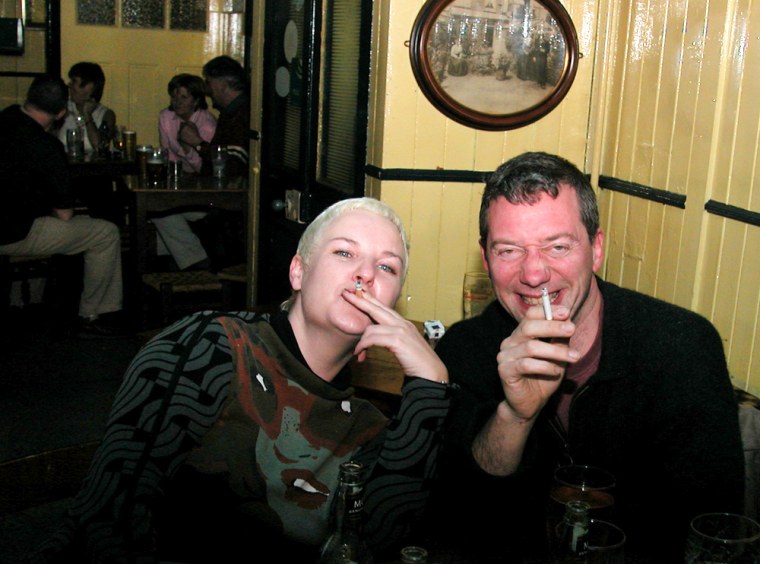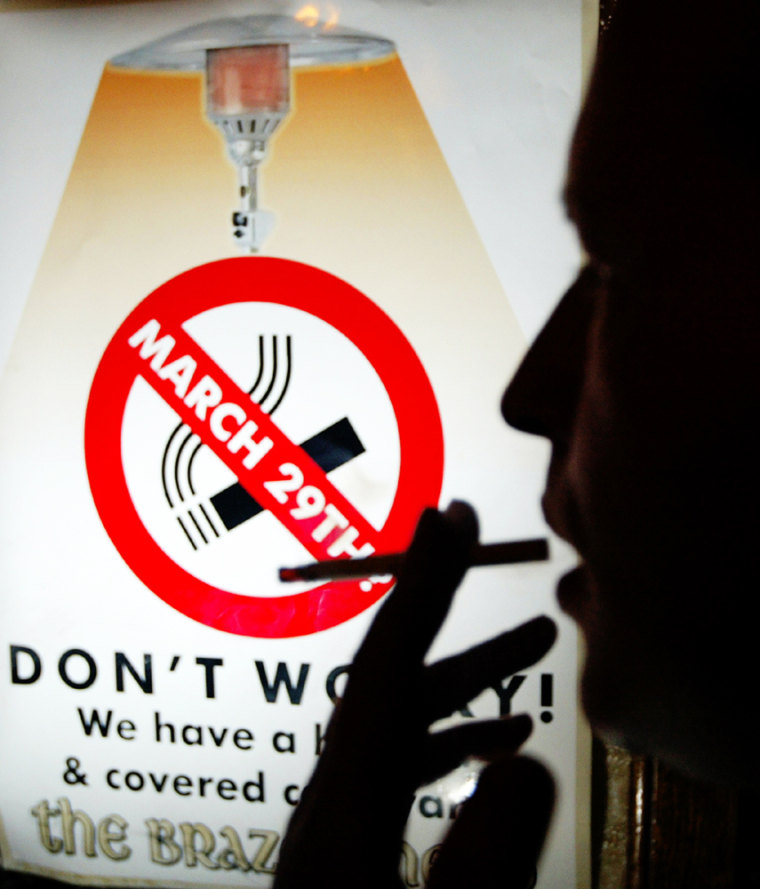Anger, defiance, and, yes, resignation. Emotions were raw, as Irish smokers bid their final public farewell to a drink and a cigarette, together.
Mandy Murphy said she will be “demented,” David French, an occasional smoker, puffed away in protest against what he viewed as an infringement on his rights, while Sue Lyons suggested she might abandon cigarettes — but moments later cast doubt on her ability to quit a habit that began in 1978.
And so the debate raged in “The Idle Hour,” a friendly local bar near the docklands of Cork, Ireland’s third-largest city, as the minutes ticked toward a momentous point in Irish history, the midnight deadline Sunday after which smoking was forever outlawed in all public houses, hotels, and places of business.
As customers watched the exciting finale to the PGA event in Florida — and local favorite Padraig Harrington’s second-place finish — smokers enthusiastically inhaled their final doses of nicotine in a public premise.
“It goes together, a pint and a smoke,” mourned Noel Grehan.
The scene in Cork was repeated across the country Sunday night, the last hurrah for an Irish tradition.
Stiff fines
Ireland has taken the lead with the law, becoming the only country in the European Union to implement such a sweeping ban on smoking — backed up by fines of up to 3,000 euros ($3,800) for infringements.
To supporters, it’s a momentous step toward curbing a nasty habit that can kill not only smokers but also those who inhale their fumes.
But to smokers, it’s political correctness run amok, led by a crusading health minister with no respect for tradition and freedom of choice.

The scene in The Idle Hour — boisterous conversation, occasional bursts of songs, clinking glasses and the gray spiral of cigarette smoke — was as quintessentially Irish as a pint of Guinness.
Indeed, the smoky Irish pub has spawned copycats across the globe, from Paris to Prague, Montreal to Moscow, from Sydney to (briefly) Kabul. Few cities in America can claim the absence of an Irish bar.
Crusade
The Irish government — and notably Cork native and Health Minister Micheal Martin — heralded the end of an era as an important step toward improving the health of the country.
“This is a positive, progressive health and safety measure, which bestows positive benefits to workers and the general public alike,” Martin said last week.
His ministry has acknowledged the shift won’t be easy — and officials say they are hoping for a 90 percent compliance rate for starters.
Anti-smoking groups such as Action on Smoking & Health (ASH) hope the ban will encourage smokers to give up the habit.
Already, the percentage of Irish adults who smoke regularly has fallen to around 25 from 31 since 1998, according to the Office of Tobacco Control, and demand has risen for nicotine replacement products.
ASH spokeswoman Valerie Coghlan said, “People that want to quit smoking are saying, 'Here’s my chance — I can’t smoke in my workplace, I can’t smoke in the pub or the restaurant, in cinemas or on airplanes,’ so lots of people are saying they see this as a help.”
The government says the ban will help save some of the 7,000 lives lost to smoking-related diseases in Ireland each year and will, for the first time, protect the country’s entire workforce from passive smoking.
First of its kind
The ban is the first of its kind in Europe and activists hope other EU health ministries will follow the Irish example.
But the nation’s pub industry doesn’t share the pioneering spirit. Apart from the unquantifiable impact on the country’s so-called “pub culture,” it fears lost jobs and detests the task of enforcing the prohibition.
‘’Their main issue is enforcement,’’ a spokeswoman for the Vintners Federation of Ireland told MSNBC.com. “Many of our members are family-run establishments and it’s very hard to ask people to go outside on a cold wet night,’’ she said.
The federation represents as many as 6,000 owners outside the capital city. They are “pro-choice, not pro-smoking,” she said, noting the VFI had offered a compromise to the government whereby non-smoking sections would be designated in bars.
The suggestion was rejected, and the VFI now fears economic disaster for members. The spokeswoman said the economic effect was already being felt in counties that border British-governed Northern Ireland.
Because no such ban existed in the north, hotels were losing out in the competition to host weddings and other functions.
In The Idle Hour, proprietor John O’Connor was more sanguine, although he expected some early objections. “If they prove it’s bad for your health, you’ve got to run with it,” said O’Connor, a non-smoker.
Any customers who light up will be refused a drink, he said. But he will become unhappy if he sees a fall in business.
Freedom, tradition
For his regulars, it was a matter of freedom and tradition.
“Drink is worse for you,” protested Mandy Moore. An Idle Hour regular, she said she might bring a fur coat to stand outside the bar, and endure the nearby Lee River’s frequent whipping winds to indulge in her habit.
“No one asked us if we wanted this,” said David French, who characterized it as a crusade by the health minister. “There was no referendum.”
French noted that a separate ban on drinking on the street would ensure that he could never enjoy the two-some pleasure of a cigarette and a pint of beer. “Micheal Martin has no idea of what this will involve,” he said.
O’Connor, the proprietor, agreed. “[Martin’s] attitude in bringing in this law was aggressive and dogmatic,” he said.
Regular John L. O’Sullivan was furthermore skeptical about evidence about passive smoking. Yet, he was resigned to grabbing a few puffs of his cigarette outside the pub and then returning for his drink.
But he predicted, “It’s going to get nasty” in other bars as owners try to enforce the ban.
For Noel Grehan, it will be especially difficult to implement the ban in small villages, where local bars are the only entertainment, and many regulars indulge in cigarettes or pipes.
But he admitted the ban could bear fruit in the long run in changing longstanding habits. “I wouldn’t want my kids to be smoking,” he said.
